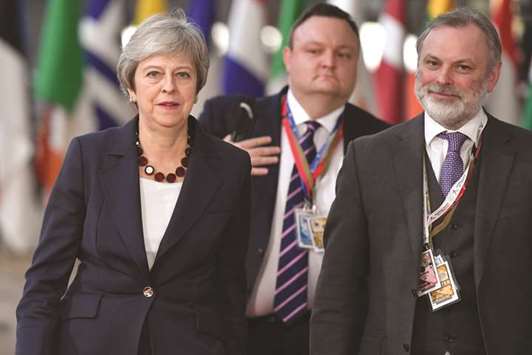British Prime Minister Theresa May said yesterday she believed a Brexit deal was still possible as she arrived in Brussels to meet her European Union counterparts, three days after talks stalled over how to manage the Irish border.
But fellow EU leaders sounded impatient, signalling that they were ready to listen to May but also preparing to discuss plans for Britain crashing out of the bloc in March without a deal.
Many suggested the core problem was May’s inability to rally her feuding party around a workable set of negotiating demands.
EU Brexit negotiator Michel Barnier said weeks of work were needed to crack the problem, promising to approach the talks “calmly and patiently”.
French President Emmanuel Macron said May could help by explaining what her precarious domestic situation would allow her to accept.
“Theresa May must tell us what she can possibly accept considering the political balance,” he told reporters.
Austrian Chancellor Sebastian Kurz said the ball was in Britain’s court but cautioned against predicting doom.
“It is always the case in negotiations that they are tense and difficult and challenging at the end. That doesn’t mean they will fail. No one wants these negotiations to fail, neither the EU nor Theresa May want a hard Brexit,” Kurz said.
May did not answer a question about whether she had brought the “creative” new proposal that summit chair Donald Tusk has asked for, instead sticking to a rehearsed line that a deal could be done and that it was in the EU’s interest to reach one.
“What we’ve seen is that we’ve solved most of the issues in the withdrawal agreement. There is still the question of the Northern Irish backstop,” she told reporters on arrival.
“By working intensively and closely, we can achieve that deal,” May added. “Now is the time to make it happen.”
Earlier, German Chancellor Angela Merkel echoed the tougher tone coming from the 27 other governments, whose leaders will gather over dinner after a presentation by May.
All member states, she said before flying to the summit, must prepare for all outcomes: “That includes the possibility that Britain leaves the European Union without a deal.”
With wrangling over how to keep Northern Ireland’s land border with the EU open after Britain leaves the EU’s customs and regulatory space, Irish Foreign Minister Simon Coveney said it was unlikely the 27 leaders would set a date for a special summit to seal a deal — as was the hope before talks stalled.
Tusk had called on May to come to Brussels with new ideas to unblock the process, but British officials have given little indication that she has much new to say as she battles deep opposition among her own allies to the kind of agreement which Brussels says is pretty much its final offer.
May earlier told parliament in London she wanted any treaty that includes the Irish border issue linked to a separate declaration the two sides intend to issue on their intentions for a close EU-UK trade pact to be negotiated after Brexit.
EU negotiators agree that a close customs and regulatory relationship could avert the kind of border disruption that risk reviving sectarian tensions in Northern Ireland, but they still want a “backstop” guarantee that if that is not in place, then the EU would keep the province in a special economic zone.
May and her Northern Irish allies reject that as posing a risk of breaking up the United Kingdom.
EU diplomats told Reuters earlier this week that Barnier offered to help defuse the issue by extending a status-quo transition period for Britain by an extra year to the end of 2021 to give time for a trade deal that would avert the need to trigger a backstop for Northern Ireland.
Asked about that, several leaders said that extending the transition, during which Britain will be bound by EU rules but have no say in them, would not be a big problem for them.
Many continental officials involved in the process have said a longer transition may be needed to conclude a free trade deal anyway.
However, May is also under pressure from Brexit supporters to cut ties to the bloc as soon as possible.
There is unlikely to be much dialogue around the table when May was to addresses other leaders later yesterday.
They have insisted that London negotiate exclusively through Barnier.
The 27 will then dine without May and hear reports from Barnier and from European Commission President Jean-Claude Juncker.
He will brief them on how the EU executive is stepping up planning and guidance for governments on what must be done to cope with Britain leaving on March 29 with no treaty in place.
Both sides are coming under pressure from business to reach agreement soon to avoid firms running up needless costs.
A joint pre-summit plea from the European auto and car parts sector warned disruption to cross-Channel supply chains would be “catastrophic” and wipe out much of a quarter-century of recovery in England’s car industry.
May will rejoin her EU counterparts today as the focus shifts to a summit with Asian leaders, including China’s Premier Li Keqiang and the prime ministers of Japan, South Korea and Russia.

Prime Minister Theresa May arrives at the European Council in Brussels yesterday.
